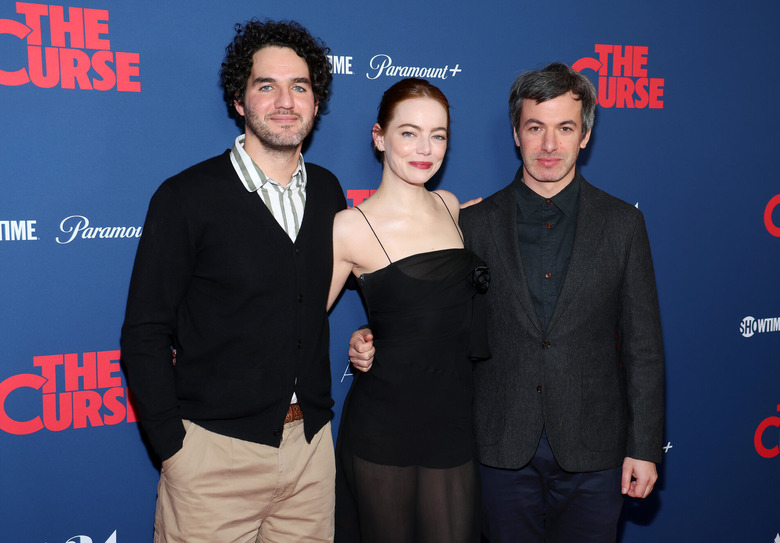The Curse On Paramount+ Is A Disconcerting, Squirm-Inducing Satire About Modern-Day America
It is, perhaps, the understatement of the year to declare that The Curse on Paramount+ with Showtime is not for everyone. If, however, you're in the mood for a bitingly satirical deconstruction of woke millennial hypocrisy and the offensiveness of do-gooders who hide their mendacity behind good intentions — well, good news: This 10-episode, genre-mashing black comedy from creators Nathan Fielder and Uncut Gems co-director Benny Safdie is just for you.
Fielder and Emma Stone play Asher and Whitney Siegel, a married couple trying to launch an HGTV reality series about flipping houses for charity. But they're not so much flipping as displacing people in order to build better homes. The Siegels are the kind of people whose real (and really unpleasant) selves are buried beneath layers of well-intentioned gestures — gestures like, for example, hiring a Native American performance artist whom Whitney keeps describing as her good friend to be an "indigenous consultant" for the house-flipping series.
Asher and Whitney are the sort of people who stand on one of their building sites and, bearing in mind that all the world's a stage, declare platitudes like: "We do recognize ourselves as having obtained this land through a long history of colonization. The many years of genocide may not be wiped away by this statement, but it's important that we acknowledge." Asher, meanwhile, at one point gives a $100 bill to a young girl selling drinks in a parking lot to make sure everyone sees how good he is — and then, when the cameras stop rolling, he hems and haws as he tries to retrieve that $100 bill so he can give the girl $20 instead.
"I curse you," is the girl's ominous, on-the-nose response.
It's sort of hard to make out whether this whole thing is a send-up of white-guilt liberalism dressed up in the guise of a kind of performance art, or if there's some other message inherent in The Curse that I'm missing entirely. But for what it's worth, no less than director Christopher Nolan has raved that the show is "incredible" and "unlike anything I've ever seen on television before."
Not that this kind of thing is definitively instructive one way or the other — but, following its divisive finale earlier this month, the show has one of those splits between critics and fans on Rotten Tomatoes (critics love it, while viewers are more or less bewildered by it).
Fielder and Safdie don't overtly preach to anyone in The Curse. At the same time, someone is being mocked here, relentlessly, with no punches pulled. And it's not for me to tell you who that is. Asher and Whitney, as I see it, represent a kind of Rorschach test to viewers, with some who will see the couple cosplaying as good but largely empty people — like when they have a fight and talk to each other in therapy babble ("I take offense to the fact that you're not validating my feelings ... I said the sentence that Lisa told us to, and you're still attacking me!").
Other viewers will see in the couple a confirmation of what they've long suspected about upper-middle-class armchair activists. The Siegels, for example, go about their business while the peons around them wear Covid masks, and Whitney, at one point during an exchange with a pickup truck-driving "deplorable," confesses to him, "I feel a little sick." Maybe that's the sneakiest trick of all that this show pulls off. I feel like most people who watch The Curse are going to feel like it throws shade at everyone else but them.
